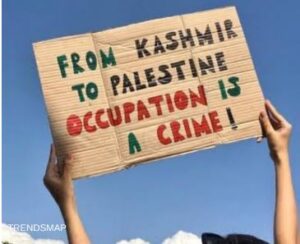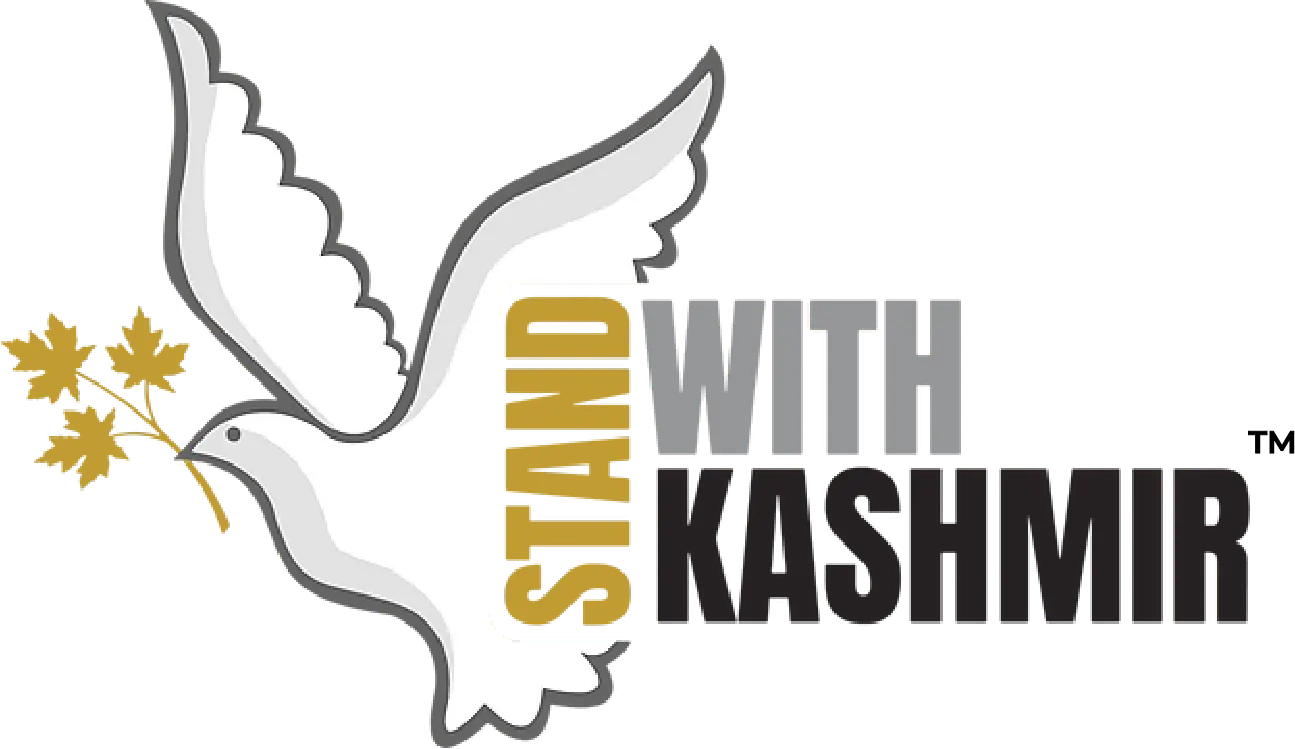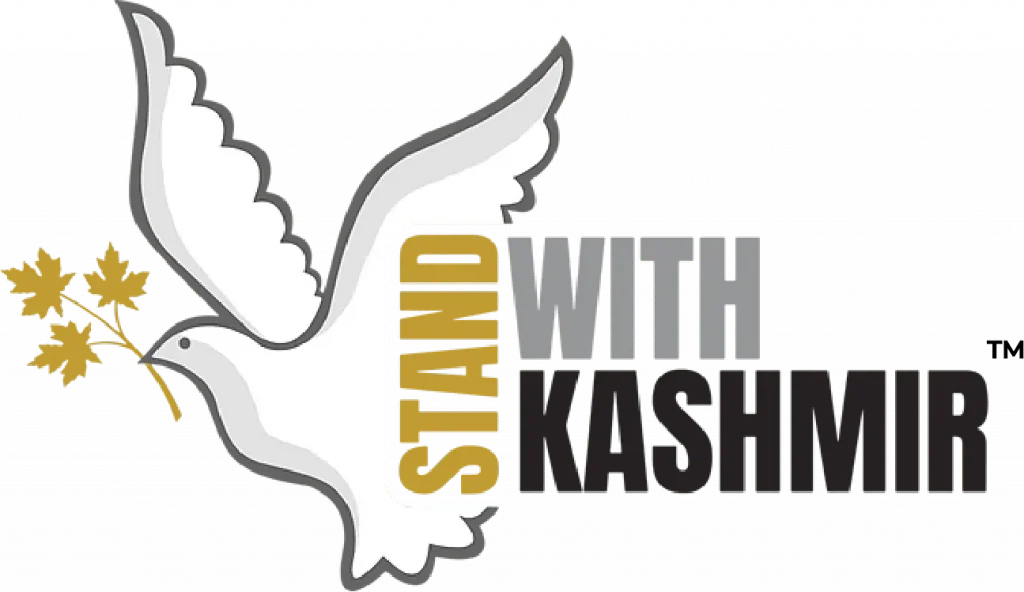At this crucial moment, as the world rallies for Palestinian liberation amidst the US backed israeli genocide in Gaza, we recognize the importance of our shared and collective struggles. Kashmiris are observing aspects of the militarized and violent response used in indian-occupied Kashmir being deployed against students protesting across the US and around the world. We see this violence and brutal state response to resistance as representative of a greater collective struggle against colonization, settler-colonization, and occupation. Through Palestine, we have learnt to speak out against the most unjust institutions, and we see echoes of Palestine everywhere. We know our struggle is interconnected and we should be ready to embody the Palestinian condition, offer unconditional solidarity, and face whatever violence may come, to achieve our collective liberation.

To those who are interested in conducting Kashmir/Palestine solidarity teach-ins in this moment, here is a short guide:
UNDERSTAND THE ISRAELI MODEL’S BROADER IMPLICATIONS
The israeli model is not an exceptional model belonging to a singular state, but rather it represents the apparatus of settler colonial rule which opposes decolonization struggles across the world. india, too, has drawn inspiration from this model as it expands its settler colonial project in Kashmir and suppresses dissident voices (journalists, academics, human rights defenders, activists etc.). Not only does the existence of israel inspire and embolden countries like india to continue their more than 75 yearlong colonial occupation in Kashmir, but it also emboldens the apparatus itself to become more violent and more destructive, allowing it to expand until it eliminates all resistance. The relentless escalation of india’s violent methods can be observed as the Modi government is set to win the elections for a third term, and Muslims in india are subjected to even more hate crimes and ethnic cleansing.

CRITICAL REFLECTION ON GLOBAL SOUTH SOLIDARITY
Just as imperialist regimes recruit insiders and diverse faces to carry out their colonial agendas, they also recruit former colonies to act as an extension of their empire. We must think more critically about the Third World/Global South movement. There is a romanticization of countries like india, which leads to the emergence of some false narratives; such as: it was an ally to oppressed and colonized people around the world, or it was in favor of Palestinian liberation. We must critically examine these narratives, which often obscure india’s violent past and present. india’s history of colonial occupation in Kashmir and its treatment of marginalized communities such as Muslim, Dalits, Sikhs and tribal communities underscore the need for a deeper understanding of the Global South’s complexities.

RECOGNIZING OUR COMMON HISTORY AND CONDITION
While the histories of Kashmir and Palestine are not the same, there are some important resonances:
- They were both butchered at the hand of British colonial rule. The Treaty of Amritsar (1846) created the Princely State of Jammu and Kashmir, with the British making a “sale deed” and handing Kashmir over to autocratic Dogra rule. The Balfour Declaration (1917) established Mandatory Palestine as the “national home for Jewish people,” putting into motion the settler-colonial project.
- israel and india were both built on ethnic cleansing and demographic change. The Nakba (1948) killed over 15,000 and displaced at least 750,000 Palestinians. Under the Dogras and right-wing militias from India, the Jammu Massacre (1947) led to the killing of and displacement of an estimated 237,000 Muslims in the Jammu region, and displaced another quarter of a million people. This massacre was erased from histories of this time by the Indian government and Kashmir’s client regimes.

- Both Kashmir and Palestine were some of the first issues to be discussed at the newly formed United Nations after World War II. The regions were split under the auspices of the UN. In the case of Kashmir, the UN called for a plebiscite to be held so that Kashmiris could decide their future. However, cold war politics and the colonial nature of the United Nations ensured that the UN never came to the aid of Palestinians and Kashmiris suffering violence and further colonization.

- Both the Palestinian Authority and PDP/NC are client regimes through which israel and india, respectively, govern their colonial territories. These client governments
suppress the resistance and allow for the further colonization of Palestine/Kashmir. These include strategies that rely on brutal force and violence but also normalization through the veneer of “development” and “progress.”
- The carceral geography of Palestine and Kashmir is eerily similar. Both regions are littered with occupying soldiers and checkpoints. Both experienced a series of
uprisings and mass popular mobilizations and were exposed to extreme military repression. The same violent methods are employed against them (rape and sexual
violence, extrajudicial killings, torture, imprisonment, the use of human shields, home demolitions, use of informers, etc). Kashmir and Palestine both suffer from ecocide,
and the destroyed Palestinian olive tree and Kashmiri apple orchards evoke the same symbolic rhetoric. In both places, existence is resistance, and rejecting the colonizer’s narrative of past, present and future informs the variety of resistance methods that are used.

- india has shared a military and strategic partnership with israel long before the Modi regime. india is the largest buyer of israeli weaponry and also co-produces them.
india contributes its workforce to israel to replace Palestinian labor and fuel israel’s war economy. Both countries have joint training sessions for their military personnel
and share technologies of rule and surveillance such as the Pegasus software and advanced drone technology. The two oppressor states are each other’s reliable allies.
- Zionism and Hindutva ideologies are both based on religious supremacy and Islamophobia. Both construct an artificial sense of victimhood and weaponize discourses of indigeneity. Just as critics of israel deal with smears of anti-semitism, Hindu nationalists are increasingly using “Hinduphobia” to silence critics of India. india and israel have used the West’s war on terror to accelerate their dominance over Muslim/Arab bodies. Kashmiri and Palestinian resistance (of all kinds) is depicted as “terrorism” while the states use greenwashing and pinkwashing to evade accountability for their expanding settler colonial project.
It is important to recognize the linkages between the U.S. settler colony and police state, israel and india. Only a shared struggle and movement can defeat the colonial axis.







